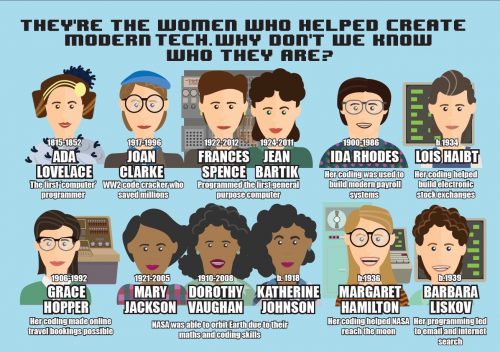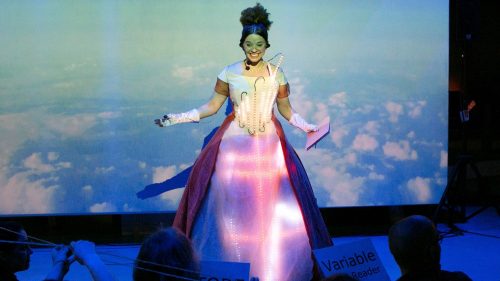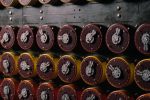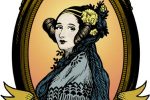New exhibition set to shine a spotlight on the rich history of women in computing
A major exhibition is set to open on October 5th at the Centre for Computing History in Cambridge. Computing History: Where did all the women go? presents a timely and fascinating new insight into the largely unrecognised inventions and contributions of women in the computing industry.
This exhibition brings together the histories of these pioneering women whose stories have often been written out by a focus on the ‘great men’. A key aim is to redress the balance to ensure these women’s contributions are once again seen as historical fact. It is also hoped that by highlighting the achievements of tech women in the past, this exhibition will help to inspire the tech women of the future.

The exhibition is supported by a programme of exciting events linked to the past, present and future of women in computing. The range of activities include everything from theatrical and musical performances to film screenings, specific student events, as well as a wide range of debates, talks and workshops where visitors can get hands-on and try something new.
The exhibition opens on October 5 with writer and activist Suw Charman-Anderson (Founder of Ada Lovelace Day) chairing a panel debate – Want to succeed in tech? Try not to be a woman – which will examine why women continue to experience sexual harassment and blatant bias in the tech industry. She is joined by journalist and author, Professor John Naughton; business women Claire Hopkins and Dr Valerie Lynch; and University of Cambridge academic, Dr Amanda Prorok.
Suw Charman-Anderson will return the following evening (Oct 6) to give a presentation about why she set up Ada Lovelace Day, an international celebration day of the achievements of women in science, technology, engineering and maths (STEM) which occurs on October 10 this year.
As part of the Centre’s Ada Lovelace Day celebrations there will be two high impact performances on October 12. The first is part of an all-day event IT Began with Ada for over 100 girls (aged 11 to 16) and the second an evening performance.
These both feature story teller and tech entrepreneur, Zoe Philpott with her award winning show Ada. Ada. Ada. In which Ada Lovelace tells her story using an LED dress which she operates – live on stage – using her wearable tech satin glove.
Other events include a film screening of Hidden Figures which tells the stories of three brilliant female, African-American mathematicians at NASA; a presentation from Professor Ursula Martin (University of Oxford), Ada Lovelace: The Programmer, the Maths, and the Myths; and an evening performance exploring the work of electronic music pioneer – Delia Derbyshire ((1937 – 2001).
Highlights over half-term week include a pop-up exhibition about women in gaming will explore the role of women in the video-game industry and a number of special girls only workshops.
The exhibition runs from October 5, 2017 to October 27, 1017.
Booking is essential. Details of all events can be found at computingHistory.org.uk
Ada Lovelace
Augusta Ada King-Noel, Countess of Lovelace (née Byron; 1815 –1852) was an English mathematician and writer, chiefly known for her work on Charles Babbage’s proposed mechanical general-purpose computer, the Analytical Engine. She was the first to recognise that the machine had applications beyond pure calculation, and created the first algorithm intended to be carried out by such a machine. As a result, she is often regarded as the first to recognise the full potential of a “computing machine” and the first computer programmer.
Ada Lovelace Day (ALD)
Ada Lovelace Day was founded by Suw Charman-Anderson in 2009 and aims to raise the profile of women in science, technology, engineering and maths by encouraging people around the world to talk about the women whose work they admire. This international day of celebration helps people learn about the achievements of women in STEM, inspiring others and creating new role models for young and old alike.
The inspiration for Ada Lovelace Day came from psychologist Penelope Lockwood, who carried out a study which found that women need to see female role models more than men need to see male role models. “Outstanding women can function as inspirational examples of success,” she said, “illustrating the kinds of achievements that are possible for women around them. They demonstrate that it is possible to overcome traditional gender barriers, indicating to other women that high levels of success are indeed attainable.”
Hidden Figures
Hidden Figures is the hitherto untold tale that reorients our view of the space race of the 1960s by telling the stories of three brilliant African-American mathematicians at NASA (Katherine Johnson, Dorothy Vaughan and Mary Jackson) who serve as the brains behind a stunning achievement that galvanised the world but who were then written out of history.
Delia Derbyshire
It was Delia who created the most famous piece that ever emerged from the BBC Radiophonic Workshop, the theme tune to Doctor Who (1963). She did it by taking a simple score by Ron Grainer and transforming it into the uncanny, iconic masterpiece we know, using her very own methods. A true seamstress of sound, she turned organic and everyday material into some of the earliest modern British electronic compositions that were way ahead of their time.
Centre for Computing History
Established in 2006, the Centre for Computing History is a charitable heritage organisation with a strong focus on learning. Since opening in Cambridge in August 2013, the Centre has made a deep impact on the educational and cultural life of Britain. Through interactive displays and exhibitions, our schools programme, learning events and workshops, and an astonishing collection of computers old and new, we help people understand how tech has shaped the modern world and revolutionised the way we live, work and play.

















